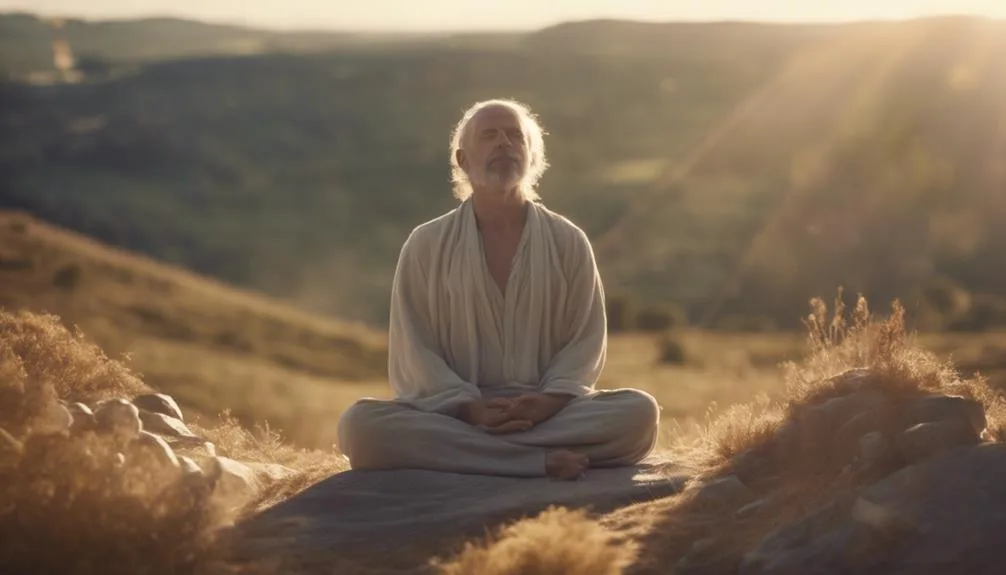In our contemporary society, where stress and distractions are omnipresent, guided meditation emerges as a beacon of tranquility and focus. This evolved form of meditation leverages verbal cues from experienced practitioners to facilitate a deeper connection with the present moment, making it particularly accessible to novices.
As we examine the methodologies and benefits of guided meditation, including stress reduction and improved mental clarity, it becomes evident that this practice holds the potential to significantly enhance one's quality of life. However, to fully appreciate the scope and efficacy of guided meditation, one must explore the structured programs and their unique approaches to fostering mindfulness and relaxation.
Key Takeaways
- Guided meditation provides a serene path to mindfulness and self-awareness.
- Incorporating stress reduction techniques into daily life enhances mental and physical well-being.
- Relaxation meditation techniques foster deep tranquility and emotional balance.
- Mindworks programs offer structured guidance to deepen meditation skills and understanding.
Understanding Guided Mindfulness
Guided mindfulness meditation, a gateway to anchoring oneself in the present moment, offers a serene path for beginners to embark upon their journey of self-awareness. Utilizing visualization techniques, individuals are gently led through scenarios that encourage the mind to focus, thereby enhancing their capacity for mindfulness.
These practices not only foster a deepened sense of presence but also unveil the mindfulness benefits that accompany regular practice. Among these are an increased ability to remain centered amidst life's fluctuations and a heightened awareness of one's internal state.
As learners progress, the nuanced layers of mindfulness unfold, revealing a profound connection to the present moment. This journey, supported by guided visualization, becomes a cornerstone for cultivating a life of mindfulness, enriching one's experience of the world.
Stress Reduction Techniques
In an era where stress pervades every aspect of modern life, discovering effective stress reduction techniques is essential for maintaining mental and physical well-being.
Among the most beneficial strategies are breathing exercises and mindfulness practices that can be seamlessly integrated into daily routines. Breathing exercises, for example, focus on deep, regular inhalations and exhalations, which help calm the nervous system and reduce stress levels.
Mindfulness practices, on the other hand, encourage individuals to stay present and engaged with their current experiences, reducing the tendency to get lost in worries about the future or regrets over the past.
Together, these techniques provide a powerful toolset for navigating the pressures of contemporary life with greater ease and resilience.
The Art of Relaxation Meditation

Building on the foundation of stress reduction techniques, relaxation meditation emerges as a profound method to soothe the mind and encourage deep tranquility. This practice, pivotal in achieving a serene state, leverages deep breathing and visualization techniques to foster an environment where calmness flourishes.
| Technique | Description |
|---|---|
| Deep Breathing | Involves slow, deliberate inhalation and exhalation to promote relaxation. |
| Visualization | Engages the imagination to conjure peaceful images or scenarios. |
These methods work in harmony to guide the practitioner into a state of deep relaxation, setting a foundation for mental and emotional well-being. Engaging in relaxation meditation not only quiets the mind but also equips individuals with the tools to navigate the stresses of daily life with grace and ease.
Key Benefits Explored
Exploring the myriad benefits of guided meditation reveals its profound impact on enhancing mental clarity, reducing stress levels, and fostering an overall sense of well-being. When exploring mindfulness benefits, it's clear that the practice is more than a momentary escape; it's a journey towards sustainable mental health and emotional balance. Guided meditation techniques practiced regularly can lead to significant improvements in various aspects of life.
- Enhances Mental Clarity: Clears the mind, facilitating better decision-making and creativity.
- Reduces Stress Levels: Offers a practical tool for managing daily stressors.
- Improves Emotional Well-being: Cultivates a sense of inner peace and happiness.
- Boosts Focus and Concentration: Assists in maintaining attention on the present moment.
- Fosters a Deep Connection with Self: Encourages introspection and self-awareness.
Exploring Mindworks Programs

Having considered the extensive benefits of guided meditation, let us now turn our attention to the comprehensive programs offered by Mindworks. The Mindworks platform is designed to cater to a wide range of needs, employing various meditation techniques to ensure everyone can find a path that resonates with them. Below is a table highlighting some key offerings:
| Program Type | Focus Area | Description |
|---|---|---|
| Mindfulness Meditation | Present Moment Awareness | Utilizes visualization and mindfulness techniques. |
| Stress Reduction | Stress Management | Offers stress-relieving practices and modules. |
| Relaxation Meditation | Enhanced Sleep & Relaxation | Involves calming sounds and imagery for deep rest. |
| Advanced Practices | Deepened Meditation Skills | For those looking to expand their meditation journey. |
Through these programs, Mindworks benefits its users by providing structured guidance, fostering a deeper understanding of meditation practices, and promoting mental well-being.
Frequently Asked Questions
How Can Someone With a Busy Schedule Incorporate Guided Meditation Into Their Daily Routine?
To incorporate guided meditation into a busy schedule, consider utilizing meditation apps during morning routines. These apps offer concise sessions, allowing for a peaceful start to the day, even amidst a hectic lifestyle.
Are There Specific Guided Meditation Practices Recommended for Individuals Dealing With Chronic Pain or Illnesses?
For individuals confronting chronic pain or illnesses, guided meditation practices, particularly those utilizing mindfulness apps and pain visualization techniques, offer a beacon of relief, guiding them through a journey of self-discovery and healing.
How Does Guided Meditation Compare With Other Forms of Meditation in Terms of Effectiveness for Beginners?
For beginners, guided meditation offers a structured approach, leveraging meditation history and technique origins for a foundational understanding. This method is effective in providing clear, instructive guidance, making it easier to engage and benefit from meditation practices.
Can Guided Meditation Be Practiced Alongside Other Mental Health Treatments, Such as Therapy or Medication?
Guided meditation can complement mental health treatments, enhancing therapeutic outcomes. Despite integration challenges and varying cultural perceptions, it offers a calming, insightful approach, beneficial alongside therapy or medication, fostering a deeper understanding of one's mental landscape.
What Are the Long-Term Effects of Consistent Guided Meditation Practice on Cognitive Functions and Emotional Well-Being?
Consistent guided meditation practice enhances cognitive functions and emotional well-being through brain plasticity, fostering stress reduction and resilience. Over time, individuals may experience improved focus, emotional regulation, and a profound sense of inner peace.
Conclusion
In the tapestry of modern life, where threads of stress and haste intertwine, guided meditation emerges as a serene oasis. Through the guidance of Mindworks, individuals embark on a transformative journey, navigating the tranquil waters of mindfulness.
This practice, akin to a beacon of light, illuminates the path toward inner peace, fostering resilience amidst life's tempests. Embracing guided meditation is akin to planting seeds of tranquility; with each session, the garden of the mind flourishes, heralding a dawn of heightened awareness and serenity.

